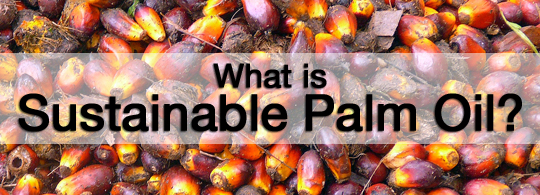The first blog post in this series explored the environmental, social, transparency and enforcement weaknesses of the Roundtable on Sustainable Palm Oil (RSPO), the dominant certification standard for palm oil companies. This post examines the colorful spectrum of positions on “sustainable” palm oil, from environmental advocacy and conservation groups to scientists and industry groups.
Organizations like Rainforest Action Network (RAN), Greenpeace and the World Resource Movement (WRM) represent one side of the palm oil debate. In March 2010, WRM released a damning report on the palm oil industry with a particular focus on the RSPO and its ability to let companies greenwash their practices. Greenpeace has echoed WRM’s position, and has released a handful of reports focused on companies that, despite RSPO membership, have been found to destroy rainforests and compromise social standards in producing palm oil.

RAN believes that palm oil certified by the RSPO can provide a certain level of assurance that non-certified/conventional palm oil can’t, but remains cautious about relying solely on the RSPO certification stamp of approval given several critical omissions, such as permissible standards around greenhouse gas emissions. The bottom line is that palm oil needs social, environmental and transparency safeguards, the RSPO can’t guarantee that these safeguards are consistently met, and therefore we believe corporations need to require these basic assurances on their own.
In the middle of the spectrum of this debate are groups like WWF, which advocates on behalf of the RSPO and certified palm oil while still sharing some of the same concerns as organizations with a stronger stance. WWF has worked within the RSPO since 2003 to ensure that compliance is monitored, and that standards contain robust social and environmental criteria, including a prohibition on the conversion of valuable forests. However, in reference to the RSPO WWF warned in May 2009: “One of the major solutions to halting deforestation of tropical forests is not catching on fast enough.” Some people remain so critical of the RSPO’s effectiveness that they have re-branded it as “Really Slow Progress Overall.”
I can’t help but wonder: will the efforts of the RSPO to make palm oil rainforest-friendly ever move fast enough to protect rainforests in Indonesia before it’s too late? Just last week, UNESCO’s World Heritage Committee decided to place the remaining rainforests of Sumatra, Indonesia on the “List of World Heritage in Danger” to help overcome threats posed by illegal logging and agricultural encroachment.
Scientists such as William F. Laurence of the Smithsonian Tropical Research Institute think palm oil can only be “sustainable” if the RSPO makes badly needed changes to its certification system, such as fixing its pro-industry bias, developing a system to monitor members that has accountability mechanisms, and taking a stronger stand against peatland destruction. According to the Conservation Biology Journal, expansion of palm oil has greater impacts than acknowledged by the RSPO.
Then all the way at the farthest reaches of the spectrum from groups like RAN and Greenpeace there is the palm oil industry itself, which is represented by groups like Malaysia’s and Indonesia’s Palm Oil Associations (MPOC and GAPKI, respectively), whose interests are driven almost solely by the pursuit of profit. Somewhere on this end of the spectrum are global palm oil traders like Cargill. It appears that many of these groups hide behind the green veneer of their RSPO membership while continuing business-as-usual practices of expanding palm oil plantations and markets at any cost.
The RSPO attracted widespread criticism in November 2009 when it opted not to include greenhouse gas emissions standards as part of its criteria for ‘sustainable’ palm oil. There was a process to deal with this serious omission, but palm oil industry groups GAPKI and MPOC have continued to sideline that process, continuing to kill the Green House Gas Emissions Working Group every year at the RSPO. It’s becoming increasingly clear that their bottom line is expansion at any cost.
It is very clear that there are vast differences in opinion on the effectiveness of the RSPO as well as the question of sustainable palm oil. RAN seriously questions whether an oil that displaces rainforests and peatlands, with heavy ties to human rights abuses and slave labor, can ever be sustainable, but remains committed to working within this unsustainable global food system to protect our planet’s remaining imperiled forests, as well as the people and species who depend on them.
We’re working to reduce the impacts of climate change by taking action for one of the last great stands of tropical forests in the world — Indonesia’s forests — and we need your help.